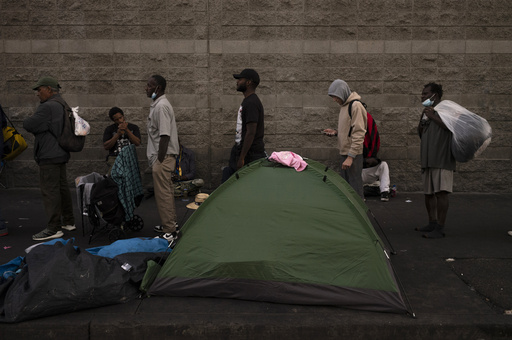SACRAMENTO, Calif. (AP) — California spent $24 billion to tackle homelessness over the past five years but didn’t consistently track whether the huge outlay of public money actually improved the situation, according to state audit released Tuesday.
With makeshift tents lining the streets and disrupting businesses in cities and towns throughout California, homelessness has become one of the most frustrating and seemingly intractable issues in the country’s most populous state. An estimated 171,000 people are homeless in California, which amounts to roughly 30% of all of the homeless people in the U.S.
Despite the roughly billions of dollars spent on more than 30 homeless and housing programs during the 2018-2023 fiscal years, California doesn’t have reliable data needed to fully understand why the problem didn’t improve in many cities, according to state auditor’s report.
“This report concludes that the state must do more to assess the cost-effectiveness of its homelessness programs,” State Auditor Grant Parks wrote in a letter to Gov. Gavin Newsom and lawmakers.
The audit analyzed five programs that received a combined $13.7 billion in funding. It determined that only two of them are “likely cost-effective,” including one that converts hotel and motel rooms into housing and another that provides housing assistance to prevent families from becoming homeless.
Under the $3.6-billion program that converts hotel and motel rooms, which is a linchpin in Newsom’s homelessness plan, the average cost of a room is at least 2.5 times cheaper than building a new home, the audit found. The housing assistance program, which has received $760 million over the past five years, gives an average of $12,000 to $22,000, depending on which county, to help a low-income family stay in their home. That’s a fraction of the roughly $50,000 the state spends on a person once they become homeless.
The remaining three programs, which have received a total of $9.4 billion since 2020, couldn’t be evaluated due to a lack of data.
Democratic state Sen. Dave Cortese, who requested the audit last year after touring a large homeless encampment in San Jose, said the report depicts “a data desert” and shows an unsettling lack of transparency at every level.
“Despite (the auditor office’s) professionalism and best efforts, they are at this time unable to … draw conclusions about things like whether or not overhead is appropriate or too high,” Cortese said, though he stopped short of calling for a halt to future spending on the homelessness issue.
Republican state Sen. Roger Niello said the lack of accountability is troubling.
“California is facing a concerning paradox: despite an exorbitant amount of dollars spent, the state’s homeless population is not slowing down,” Niello said in a statement. “These audit results are a wake-up call for a shift toward solutions that prioritize self-sufficiency and cost effectiveness.”
Newsom has made tackling homelessness a top priority, and the growing crisis is sure to dog him should he ever set his sights on a national elected office. He has pushed for laws that make it easier to force people with behavioral health issues into treatment, and he campaigned aggressively for a proposition that voters passed in March that imposes strict requirements on counties to spend on housing and drug treatment programs to help tackle the state’s homelessness crisis.
Among other things, the audit found that the California Interagency Council on Homelessness, which oversees the implementation of the homelessness programs, hasn’t tracked spending or whether programs were working since June 2021. The council has no consistent method to collect outcome data for these programs, and it doesn’t verify the accuracy of the data submitted by municipalities, the audit found.
Furthermore, the state database includes deleted records and test entries, and some data on the number of program participants might be overstated, the audit found.
The council, which lawmakers created in 2017 to help deal with the homelessness crisis, has only reported on homelessness spending once, according to the audit. Without reliable and recent data on its spending, “the state will continue to lack complete and timely information about the ongoing costs and associated outcomes of its homelessness programs,” the report says.
In a written response to the auditor’s office, Meghan Marshall, who heads the council, agreed with the audit’s findings and vowed to implement its recommendations “where possible.” But she also noted that the council has limited resources to put toward collecting data and that lawmakers had only required it to complete a one-time assessment.
In response to questions from The Associated Press, the council said local governments also need to step up.
“The State Auditor’s findings highlight the significant progress made in recent years to address homelessness at the state level, including the completion of a statewide assessment of homelessness programs. But it also underscores a need to continue to hold local governments accountable, who are primarily responsible for implementing these programs and collecting data on outcomes that the state can use to evaluate program effectiveness,” the statement reads.
The state auditor also reviewed homelessness spending in two major cities, San Jose and San Diego, and found that both failed to effectively track revenue and spending due to a lack of spending plans.
This website uses cookies so that we can provide you with the best user experience possible. Cookie information is stored in your browser and performs functions such as recognising you when you return to our website and helping our team to understand which sections of the website you find most interesting and useful.
